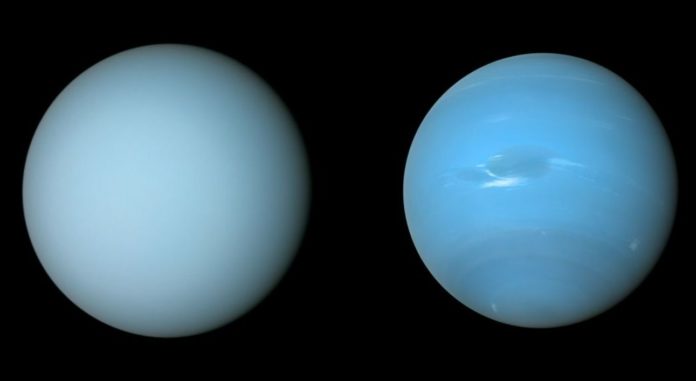Despite the fact that Neptune and Uranus have identical masses, diameters, and atmospheric compositions, Neptune appears to be bluer than its planetary neighbor Uranus.
According to a new study led by Professor Patrick Irwin of the University of Oxford’s Department of Physics, the varied shades of blue are caused by a layer of haze that exists on both planets. If there wasn’t any haze in Neptune and Uranus’s atmospheres, they would both look almost the same shade of blue.
An international team of researchers used data from the Hubble Space Telescope, the NASA Infrared Telescope Facility, and the Gemini North telescope to make a model of the aerosol layers in Neptune’s and Uranus’s atmospheres.
According to Professor Irwin, lead author of the article published in Journal of Geophysical Research: Planets, “This is the first model to simultaneously fit observations of reflected sunlight from ultraviolet to near-infrared wavelengths.”
And “it’s also the first to explain the difference in visible colour between Uranus and Neptune.”
The team’s model includes three haze layers in the atmospheres of each planet, each at a different height. Uranus has a thicker haze layer just above the methane condensation level than Neptune, which alters the planet’s visual color.
On both planets, methane ice condenses on the particles in the middle layer, making a shower of methane snow that pulls the haze particles deeper into the atmosphere, where they can help hydrogen sulfide ice condense and form a separate, deeper layer of cloud/haze.
Neptune’s atmosphere is more active and turbulent than Uranus’, implying that Neptune’s atmosphere is better at churning up gaseous methane into the haze layer, where it can condense on the haze particles and generate this snow. This operation clears more haze and keeps Neptune’s haze layer thinner than Uranus’, giving Neptune a bluer appearance than Uranus.
Excess haze on Uranus, on the other hand, accumulates in the planet’s stagnant, sluggish atmosphere, giving it a lighter hue than Neptune.
The team’s research also revealed the presence of a second, deeper layer in the model that, when darkened, might explain for dark spots seen on Neptune and more sporadically on Uranus, such as the renowned Great Dark Spot (GDS-89) on Neptune seen by Voyager 2 in 1989.
While astronomers were already aware of dark areas in both planets’ atmospheres, they had no idea which haze layer was creating them or if they were generated by a thinning or darkening of that layer.
“We hoped that developing this model would help us understand clouds and hazes in the ice giant atmospheres,” added Dr. Mike Wong, an astronomer at the University of California, Berkeley, and a member of the research team.
According to Dr. Wong, “explaining the difference in colour between Uranus and Neptune was an unexpected bonus!”
Image Credit: Getty
You were reading: New research explains Why Uranus And Neptune Aren’t The Same Color
